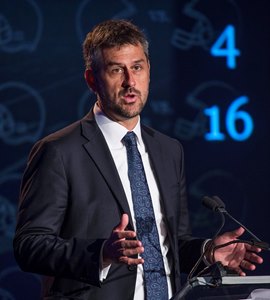McKinsey: Better Scheduling Would Add Handle


While negative fan reaction on social media may motivate some tracks to address overlapping post times, an expert on big data provided a number that might be large enough to push holdouts toward one of the rarest commodities in United States racing: cooperation.
Eight days after the two most lucrative races of Aug. 5—the Whitney Stakes (G1) and West Virginia Derby (G3)—were conducted at the same time, McKinsey & Company partner Ben Vonwiller, presenting at the Round Table Conference on Matters Pertaining to Racing in Saratoga Springs, N.Y., said big data can help U.S. racing develop a better race schedule.
The large number cited was $400 million—as in the estimated bump in handle if tracks were to better coordinate post times. The $400 million figure would represent a 3.7% increase in handle, a spike in wagering not seen in U.S. racing since 2000. Vonwiller said that even if just the five top tracks worked together, the industry could see a $150 million bump in handle.
The 2011 McKinsey report, "Driving Sustainable Growth for Thoroughbred Racing and Breeding," called for such race overlap problems to be addressed, but The Jockey Club chairman Stuart Janney III said that hasn't happened.
"This is money that's available to us if we work together," Janney said. "We should be ashamed of ourselves if we don't figure out a way to take advantage of this."
In an initial McKinsey study, it was found that scheduling most assuredly does matter in terms of handle and that there are available times throughout the day that would allow for improvements. McKinsey recently used big data to formulate a schedule for the NFL and used that approach to initially look at horse racing.
"To give you an idea of the power of this technique, our team, in seven hours, was able to find a schedule that was better than the last one published," Vonwiller said of the NFL work. "We took that team to look at what we could do in racing."
In the study McKinsey looked at races by purse size and saw significant overlap. The study found significant value if such overlap could be eliminated or reduced.
Some feedback from industry stakeholders to McKinsey noted that overlap could only be eliminated if every track cooperates, tracks willing to coordinate efforts to avoid overlap are already doing so, different tracks like to stay on different live schedules in terms of time between races, and post drags defeat many of the benefits of schedule optimization.
Vonwiller left the study convinced that scheduling improvement to avoid race overlaps could be accomplished through development of an algorithm. He also said it would be good to have a central leader on the issue, perhaps a television partner like TVG.
